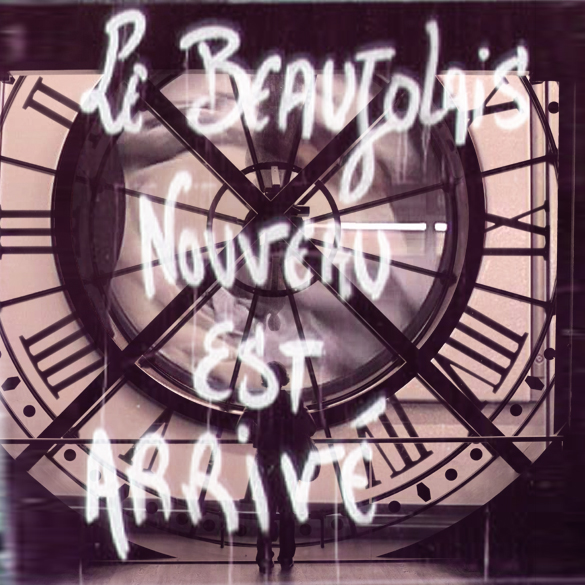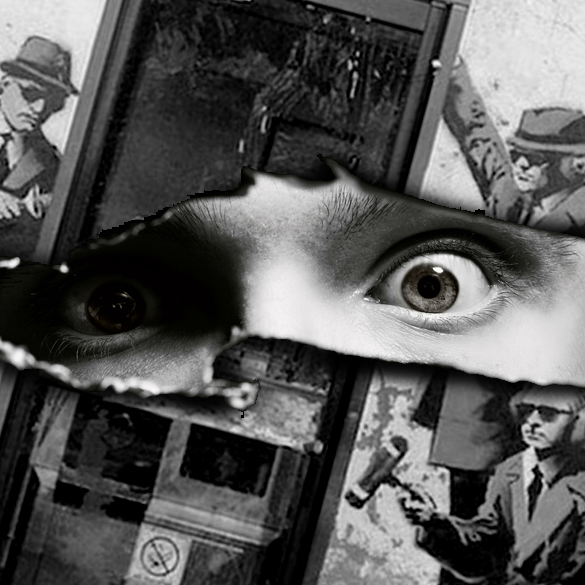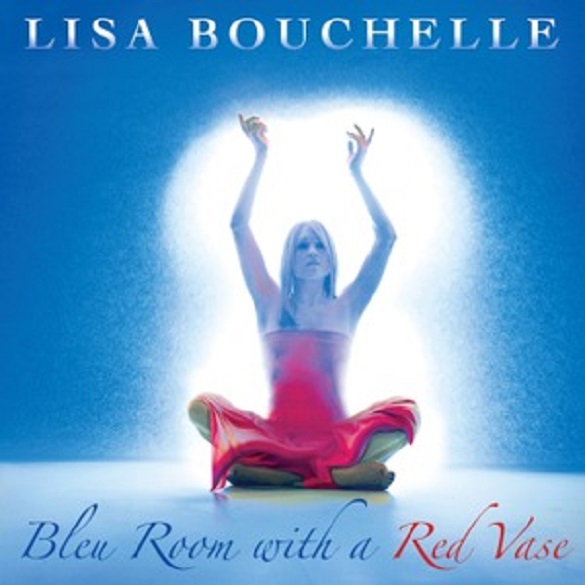The guidebook promised “a revered afternoon,” the city would stop, people would spill out of the cafés and brasseries, and, sure, there were plenty of signs in the windows: Le Beaujolais Noveau Est Arrivé!, but most places were empty, apparently no real rush to uncork the first bottles. So, until things picked up, if they ever would, I thought I’d do something quite ordinary, my laundry, and when I got it spinning, a full load at the Lav-Club on the rue Frédéric-Sauton, I walked the few blocks to Le Vermeer Café.
It was quiet inside. Three Sorbonne students were playing cards by the toiletries; a collie was asleep by the coat rack.
Since they charged more at the tables, I stood at the bar and ordered a glass of the Duboeuf. I figured that by the time I finished, my clothes would be done and I’d walk back and move them into the dryer.
The wine was good, fruity, not too acidic, and, through the window, I could see a tour boat sailing passed the Notre Dame. I’d been in town for almost a week, an extravagant jaunt with Tyler and Ray, also unemployed, but had yet to go inside the church.
With no one to talk to—the bartender, glassy-eyed and grumpy, was scribbling in an appointment book—I started thinking about Julia. I should have made a move when I had the chance. But there had always been a reason not to. She had kind, blue eyes, dark, fragrant hair, and a terrific smile, and, according to Tyler, she’d hooked up with a certified financial planner from Park Slope.
It should have come as no surprise. Despite minor flaws, a sometimes short temper, a mildly suspicious nature, she was a good catch but I’d kept myself in the friend zone for too long. She’ll probably end up marrying him, her biological clock ticking, and an image of the clock at the Musee d’Orsay, which we’d seen the other day, flashed in my head.
But I want kids too, but not now, someday though, and Crazy Ray said she liked me. And I remembered walking with her in the park, near the lake, through red and orange leaves and a tunnel of fog. She was upset, her voice trembling. Her car had been broken into, her puppy stolen. At that moment, she needed more than friendship. What was I thinking? I should have held her in my arms.
An American voice began filling the room. I hadn’t heard one since the night before, when in a club on the St. Germain, I’d struck up a conversation with a nurse from Tallahassee. But this one was different: masculine, loud, and self-assured, and it belonged to a white-haired, squinty-eyed man on the other side of the bar. He was wearing a crumpled sport coat, his cheeks pockmarked, and the bartender was pouring him Jack Daniels. He was with another man, much younger, bald-headed with large-frame glasses, a bit mousy-looking, I thought, and they were talking about the recent U.S. presidential election, the older man saying how he’d watched the returns at Harry’s and that a straw poll had been taken there and that it had correctly picked the winner since Kennedy-Nixon. “And they were right again,” he added, his laugh like a gasp.
“Too bad,” the younger man replied, turning a page of his newspaper.
A few moments passed, the wine was going down quickly, and I remembered my restaurant idea, a Latin fusion place with salsa dancing at night. I’d been carrying it around for a while and, being laid off, the timing was beginning to feel right. When I get back, the first thing I’m going to do is call Pablo. We’ll start drafting the business plan. Having worked most my career in the restaurant industry with one of the nation’s largest barbeque chains, I knew the business-side, and Pablo, a chef trained in Central American and Caribbean cuisine, certainly knew the menu. I still want to do it on the Lower Eastside but the last time we spoke he said we were priced out. He wanted to open it in Washington Heights but I don’t want to go up there.
Just then, a woman walked in, her eyes searching the room, her mouth hanging slightly open. After a while, she headed toward the bar. Though her nose was a bit too big for her face, her friendly, brown eyes and full lips made her attractive. Sighing, she placed her leather bag on the bar and dropped her cell phone into it. She then draped her coat over the seat beside me and sat. She was wearing a denim, button-down shirt, the NBC peacock logo on the breast pocket, and, with a little girl’s voice, she called to the bartender, “Bonjour, Fareed! Je suis fatigué! I had some day!”
He shuffled over and poured her some Beaujolais and I started talking to her. She was from Philadelphia, the Main Line, born and bred, and working as a production assistant for a French television station. She had just come from the Champs-Élysées where the American TV show Access Hollywood had done a live broadcast from Planet Hollywood. “How long you here for?” she asked.
“Another couple of days. We’re taking a break from one another.”
“Before you kill each other?”
“Yeah. Something like that.”
She started telling me about her boss and how he’d blamed her for misspellings on cue cards and how she had nothing to do with them and, halfway through her story, the bartender came over and asked me if I wanted another. I’m supposed to be leaving, I thought, as I stared at my near empty glass. But with her beside me—her eyes seemed to invite companionship—I figured the laundry could wait, so I gave him the go-ahead and he refilled my glass.
She finished her story—the next time she would just have to do the damn cue cards herself—and then she segued into telling me about how she’d once spent a summer working a cash register in a sporting goods store in Santa Monica.
“I was there once,” and I tried remembering the pub I was at. “The King’s Head?”
She hit my arm with the back of her hand. “We used to go there all the time.”
I told her about Bruges, walking the wet cobblestones, climbing the bell tower, and how Tyler had lost one of his bags after leaving it on a train. She wanted to know where I was originally from.
“Maine.” And I tried my best to describe Cumberland County’s endless winters.
“My father used to hose down our driveway so when it froze we could ice skate.” She smiled; it appeared she held the memory dear. “So tell me, where’d you go to college?”
“Tulane,” and she explained how she’d wanted to go to McGill but wound up at the University of Maryland, where she’d smoked a lot of dope.
I learned some other things: she’d once owed the IRS two thousand dollars, loved the sound of Patsy Cline’s voice, wore a lot of sleeveless dresses, and had a brother who, a few years back, had been killed in a car accident.
The last remark seemed to drain her of all enthusiasm.
“I never got to tell him how I felt.”
“That must have been difficult.”
She shifted in her seat and there was a long silence, peculiar in that I didn’t know if I should interrupt it or not, and as I was trying to find words that might make up for my complete understatement, she said, “What do you want out of life?”
No one had ever asked me that in such a pointed way. “Everything.”
“Be careful with that. You’ll wind up with nothing.” And then she wanted to know where I was staying.
“Hotel Studia.”
Her back straightened and her eyes widened. “Oh! Right on the St. Germain.”
“I couldn’t sleep the other night. I’ve been a little under the weather . . .”
“Oh?” She looked genuinely concerned.
“No, no, it’s nothing. It’s just a cold. And I thought I’d go out for a walk, get some fresh air, but I couldn’t get out. At two in the morning, they lock you in.”
She laughed. “Did you forget and think you were at the Ritz?”
The place was picking up, a family of five was being seated in the dining room, the collie had awoken and was licking the hand of one of the students, and then a large group walked in; they were noisy, and someone mentioned that they were from the Netherlands and to accommodate them—there must have been a dozen of them—one of the waiters pushed three tables together.
“Why all the fuss over the Beaujolais?”
She put a cigarette in her mouth and shrugged. “Tradition. Their unofficial drinking day. They fly it all over the world. The Concorde takes it to New York.” There was a man with sleepy eyes on the other side of her and she borrowed his cigarette to light hers.
“Are you going to stay in Paris?”
Handing the cigarette back to the man, she said, “No. I want to go home. It can be lonely and my mother’s sick. But not now. I’m getting such amazing experience.”
My glass was near empty again. I’m drinking too fast, I thought. It’s not beer. Slow down. There’s more alcohol. On an empty stomach too. You don’t want to get into trouble. “What’s your name?”
“Sara.”
I took another sip. I didn’t want to go. I wanted to keep talking. She had a charming frankness that I found refreshing.
But my clothes, heavy and wet, would either be taking up space in the washer or sitting somewhere else, atop a dryer or window ledge, someone having removed them. “You gonna be here a while?” I asked as I finished off the wine.
“I should be.”
And I told her about my laundry. “I’ll be back in a few minutes.”
It’d been overcast earlier but outside the sun was coming through. At one end of the street, a man in a hard hat was breaking up the sidewalk with a jackhammer, the sound of the blows loud enough to make me wish I had earplugs. My throat felt scratchy so I took a lozenge. On the Quai Montebello, moist air was blowing, and I began to make my way.
When I got to the Lav-Club, I smelled something sharp. Was it sulfur?
Inside, it was dark and the machines weren’t running and no one was around. I went to open my washer but the door was locked. I checked the others. They were locked too. Strange.
I stepped outside. The wine had given me a good buzz and as I looked up and down the street—it was more crowded than before—I felt groggy. Across the street was a bakery, doll shop, and Libyan restaurant. I should go in one of those. Maybe they know what’s going on. But then I thought of Sara. I should just head back.
From inside the Lav-Club, I heard a thud, like someone moving a heavy piece of furniture had dropped it. I walked back in. No one was there but I heard the sound of feet hurrying down steps; it was coming from inside the wall. Through a hidden door, an old, dark-haired woman in a lime-green dress appeared. She was tiny and tired-looking, in her hand a glass of red wine. Beaujolais, I assumed. In French, she wondered aloud why the power had failed. She put down her glass on one of the dryers and began checking the washers but none would open.
“He’s coming,” she finally said.
“Who?”
“Le propriétaire,” and she pointed to a plastic chair and I sat. There was a machine mounted on the wall; it looked a little like an air-conditioner. She removed its cover and began fiddling with the parts. I assumed it was related to the washers.
“When’s he coming?” I asked.
“Un moment, je vous prie,” and she continued fiddling.
This may take a while, and I stood.
But then the lights flashed; it was only for a moment but she nodded as if she were making progress. I figured I’d give her a few more minutes but then a greasy-haired, stocky man walked in. Grunting, he waved her off and putting on his glasses he began inspecting it. “Is everything all right?” I asked. He turned and gave me a look that said, Do not disturb me. I folded my arms and he went back to work. Soon, a self-satisfied smirk appeared on his face. He knows how to fix it, I thought, and, from his back pocket, he pulled out a wrench and began turning a bolt. A couple of minutes passed and he started looking for the cover. “Over there,” I said. “There!” Eyeing me with disdain, he picked it up off the washer and began putting it on. When he’d secured it, he started pushing buttons on the panel but nothing happened. Maybe he doesn’tknow what he’s doing. He sighed and lowered his head. It seemed to signal defeat. Looking at my watch, I headed for the door, but then the lights came on and the washers and dryers started humming.
I checked my washer; the cycle was only a little more than halfway through; it would be another ten minutes. Should I wait or go? I wasn’t sure. Sara didn’t look as if she’d be going anywhere anytime soon so I started waiting but after a long minute I thought, Fuck it!
The brasseries were filling up and, though it wasn’t the way I’d come, hoping it might be a shortcut, I made a right onto the rue de l’Hôtel Colbert. As I approached the Quai Montebello, I began picking up my pace but when I turned the corner I came upon a crowd of tourists, their sunglasses, guidebooks, cameras, backpacks, like armor. Where the hard hat had been jackhammering, two vans had pulled up and men were unloading bags of cement, creating a pedestrian bottleneck. I walked into the street, unfortunately without looking, and had to dart out the way of an approaching truck. I continued along, a little shaken, and moments later, a bit out of breath, I stepped inside the café. Where she’d been, a brown-haired man in a bow tie stood. He was talking to a pear-shaped man whose shirttails were hanging out. I looked around; the place was crowded; the day’s festivities were in full swing, but there was no sign of her. Maybe she’s in the bathroom. But she wouldn’t have taken her coat. I pushed my way to the bar and found a place next to the white-haired, squinty-eyed man. A short while later the bartender came over. “She just left.”
“How long?”
“Two, maybe three minutes.” And he pointed to the window. “Her phone rang. I think she thought you’d forgotten her.”
I felt the urge to run out. I even got halfway to the door. But thinking more about it, I stopped. It seemed ridiculous. We’d only been talking a few minutes. She’d probably think I was nuts. Besides, I’d be leaving in two days.
The bartender poured me a glass. “She’ll be back next week,” and the white-haired, squinty-eyed man turned to face me. “I was just telling Gustave over here that the best food isn’t in Paris. You have to go to the countryside.” His breath was bad, his teeth dentures, and he began going on and on about how for the past thirty years he’d been working in the oil industry, first with DuPont and now with Chevron and that, every time he wanted to retire, his boss just threw more money at him. “My wife will be joining me in a few days,” he continued, as I hurried to finish my wine. “I haven’t seen her in three months.” And I thought I saw a speck of regret in his eyes. “Women love to shop in Paris. My credit card’s going to get some workout.”
Outside, dusk was gathering. Maybe I should’ve just run out. If I were desperate, I would have. The Notre Dame was lit up. Another tour boat was passing. Further along, I spotted a woman walking a dog, and, as she approached, I thought that maybe it was her, but when she got closer I saw it wasn’t. Maybe she’d have been happy. We’d be in Le Petit Tianon now eating scallops and she’d be telling me why it’s lonely here and I’d be telling her why she needs to move back to the States. On the rue Frédéric-Sauton, three men were coming out of the bakery. As I neared, a woman holding a baguette stepped out and nearly lost her footing. She had a nicer smile, and I turned into the Lav-Club. Two dirty-faced kids were watching a washer spin. I opened mine and started pulling out my clothes. I’d throw them in the dryer and get a bite to eat at the Libyan restaurant.
THE END
—
P. J. Gannon is a writer in New York City. His work has appeared in The Alembic, Slow Trains, Amarillo Bay Literary Magazine and other literary journals. John Cheever, T. C. Boyle, and Ha Jin are among his favorite writers.



